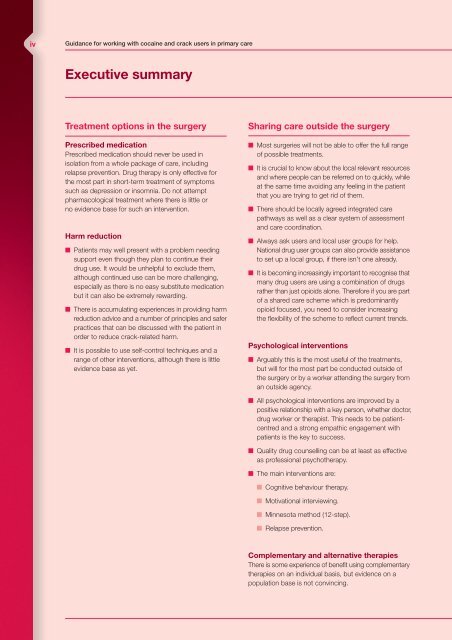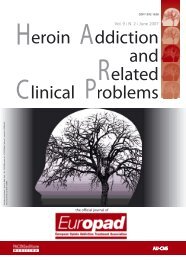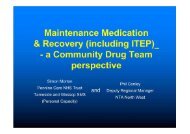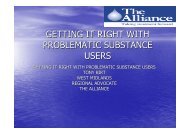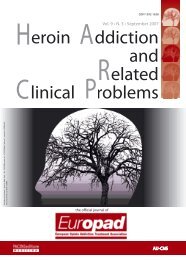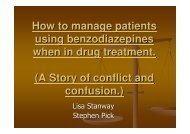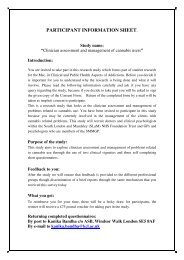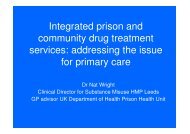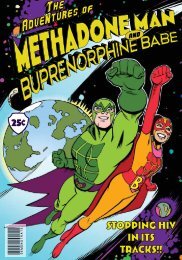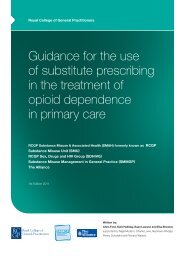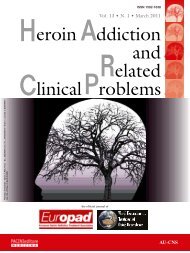cocaine guidance - Royal College of General Practitioners
cocaine guidance - Royal College of General Practitioners
cocaine guidance - Royal College of General Practitioners
- No tags were found...
Create successful ePaper yourself
Turn your PDF publications into a flip-book with our unique Google optimized e-Paper software.
ivGuidance for working with <strong>cocaine</strong> and crack users in primary careExecutive summaryTreatment options in the surgeryPrescribed medicationPrescribed medication should never be used inisolation from a whole package <strong>of</strong> care, includingrelapse prevention. Drug therapy is only effective forthe most part in short-term treatment <strong>of</strong> symptomssuch as depression or insomnia. Do not attemptpharmacological treatment where there is little orno evidence base for such an intervention.Harm reduction■ Patients may well present with a problem needingsupport even though they plan to continue theirdrug use. It would be unhelpful to exclude them,although continued use can be more challenging,especially as there is no easy substitute medicationbut it can also be extremely rewarding.■ There is accumulating experiences in providing harmreduction advice and a number <strong>of</strong> principles and saferpractices that can be discussed with the patient inorder to reduce crack-related harm.■ It is possible to use self-control techniques and arange <strong>of</strong> other interventions, although there is littleevidence base as yet.Sharing care outside the surgery■ Most surgeries will not be able to <strong>of</strong>fer the full range<strong>of</strong> possible treatments.■ It is crucial to know about the local relevant resourcesand where people can be referred on to quickly, whileat the same time avoiding any feeling in the patientthat you are trying to get rid <strong>of</strong> them.■ There should be locally agreed integrated carepathways as well as a clear system <strong>of</strong> assessmentand care coordination.■ Always ask users and local user groups for help.National drug user groups can also provide assistanceto set up a local group, if there isn’t one already.■ It is becoming increasingly important to recognise thatmany drug users are using a combination <strong>of</strong> drugsrather than just opioids alone. Therefore if you are part<strong>of</strong> a shared care scheme which is predominantlyopioid focused, you need to consider increasingthe flexibility <strong>of</strong> the scheme to reflect current trends.Psychological interventions■ Arguably this is the most useful <strong>of</strong> the treatments,but will for the most part be conducted outside <strong>of</strong>the surgery or by a worker attending the surgery froman outside agency.■ All psychological interventions are improved by apositive relationship with a key person, whether doctor,drug worker or therapist. This needs to be patientcentredand a strong empathic engagement withpatients is the key to success.■ Quality drug counselling can be at least as effectiveas pr<strong>of</strong>essional psychotherapy.■ The main interventions are:■ Cognitive behaviour therapy.■ Motivational interviewing.■ Minnesota method (12-step).■ Relapse prevention.Complementary and alternative therapiesThere is some experience <strong>of</strong> benefit using complementarytherapies on an individual basis, but evidence on apopulation base is not convincing.


